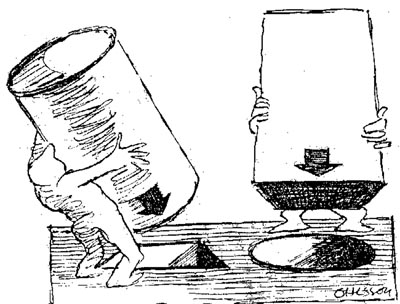November 22-2013
Emanuele Ottolenghi
Who would have ever thought that the only thing standing between the tree-hugging brigade and a nuclear-armed Iran would be a French socialist government?
Yet, that is precisely what happened in Geneva last week, when the French Foreign Minister, Laurent Fabius, prevented his Western counterparts from capitulating to Iran in a deal that would effectively involve no meaningful Iranian concessions in exchange for sanctions relief worth billions of dollars.

The deal did not entail a drastic reduction of centrifuges or of Iran’s stockpile of enriched uranium. Most ominously, it made no meaningful effort to roll back Iran’s progress toward completing a heavy water reactor that could produce weapons-grade plutonium.
In exchange for conceding nothing of substance, Iran was offered sanctions relief on gold purchases, access to frozen assets worth billions of dollars, a lifting of restrictions on sales of petrochemical products (one of Iran’s key exports) and a relaxation of aviation and automotive industry sanctions. Considering that all three sectors are controlled by the Iranian government, the Supreme Leader’s sprawling business empire and the Revolutionary Guards, it is remarkable that US, British and German diplomats thought this was a good idea.
Making concessions on all three fronts will provide a much-needed cash injection to Iran’s leading proliferators. It will also open up those industrial sectors where dual-use technology is most common — both the car industry and the petrochemical sector rely on machinery that can be used for centrifuge production and enrichment activities.
So much for the relief — not to help ordinary Iranians get by, but to enable the regime to reach the nuclear finish line while feigning innocence.
A question lingers as media and pundits dissect the events and issue post-mortems: Why did France scuttle the deal? The answers vary. They include: French vainglory (pretending to be world leaders again); French business greed (getting ahead of America in arms sales to Gulf countries); one particularly amusing story about a Jewish member of parliament warning Mr Fabius that Benjamin Netanyahu would bomb Iran; and one less amusing insinuation that claims that Mr Fabius blocked the compromise because of his Jewish ancestry.
Israel can presumably communicate its displeasure to France without relying on a hitherto unknown member of the French National Assembly. And while the French may wish to sell their fighters to the Saudis, their business would benefit more from the lifting of sanctions.
The facts are simpler. The deal was bad. And France, having been through ten years of intense negotiations and countless Iranian volte-faces, did not wish to sign off a deal which would leave Iran’s ability to cross the finish line substantially intact while releasing the pressure that brought Iran to the negotiating table in the first place.
Vive la France then. The deal that was not may still be revived. But if the French are truly committed to non-proliferation — and they gave the world every reason to believe so in their decade-long participation in the P5+1 negotiations with Iran — then they will guarantee that US President Barack Obama’s words that “no deal is better than a bad deal” was not just an empty promise.
Emanuele Ottolenghi is a Senior Fellow at the Foundation for Defence of Democracies, Washington DC
